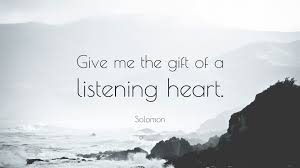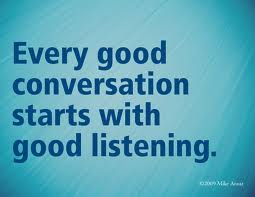“Too often we underestimate the power of a touch, a smile, a kind word, a listening ear, an honest compliment, or the smallest act of caring, all of which have the potential to turn a life around.”
― Leo Buscaglia
I don’t know how you feel, but I find one of the hardest things to do is to watch someone in pain. As much as we want to, we can’t take away someone else’s pain. Unfortunately, each of us has to sort through uncomfortable feelings and find a way to get to the other side.
 One of the most comforting gifts you can give to someone whether in pain or not, is to listen. Allow them to express their feelings anyway they need.
One of the most comforting gifts you can give to someone whether in pain or not, is to listen. Allow them to express their feelings anyway they need.
Listening is not as easy as it sounds. Most of us have trouble listening to others express their feelings. It makes us uncomfortable. We’d rather share positive feelings. When confronted with feelings of sadness, anger, regret, guilt and anything else negative, quite often we want to run away!
How do we learn to listen well? I’ve learned much about listening to share with you.
One of the basic techniques of listening is called active listening. Active listening is the ability to do everything possible to help the other person fully express their feelings without any regard for your own feelings.
When someone is experiencing feelings intense, dark and too numerous to handle, human nature may want to jump in, offer suggestions, or even distract the person to move past the negativity. Instead, what would be helpful is to not say anything. Allow the person to say what is on their mind and offer no solutions.
 Once everything is fully expressed you can acknowledge and validate what they said: “I can understand how you feel right now.” You can also suggest, “With time, your feelings can change and you might not feel so unhappy.”
Once everything is fully expressed you can acknowledge and validate what they said: “I can understand how you feel right now.” You can also suggest, “With time, your feelings can change and you might not feel so unhappy.”
Being genuine is key. When learning to actively listen, it doesn’t mean you don’t give your honest feelings. Active listening is to allow the other person to fully express their true and honest thoughts about whatever they are experiencing and to leave your thoughts and opinions out of the conversation.
Could have, should have and would have have no place when listening. Many times a person in pain may have the need to express in any or all of these tenses. “If only, he listened to me, they could have” or “he should have done such and such” are statements you may hear.
Listening can be awkward and challenging. With practice and in time, you may feel differently. You may find it is not difficult after all. Your only requirement is to listen with an open heart without having to say anything or offer any particular solution to contribute.
Holding space for another person to openly express their feelings is a true gift. A gift we can all benefit from as we listen to someone or someone listens to us.
May listening be a skill you embrace, master and share with others.
Leave a Reply